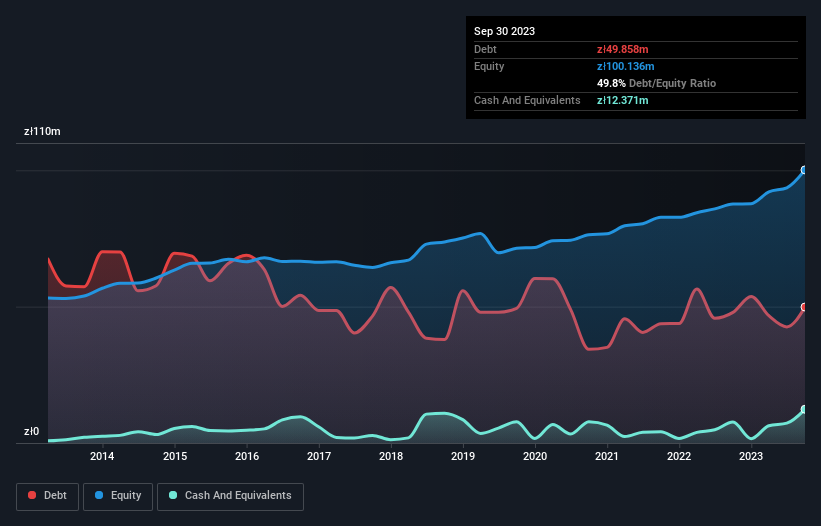- Poland
- /
- Food and Staples Retail
- /
- WSE:ATP
These 4 Measures Indicate That Atlanta Poland (WSE:ATP) Is Using Debt Reasonably Well

Legendary fund manager Li Lu (who Charlie Munger backed) once said, 'The biggest investment risk is not the volatility of prices, but whether you will suffer a permanent loss of capital.' When we think about how risky a company is, we always like to look at its use of debt, since debt overload can lead to ruin. We can see that Atlanta Poland S.A. (WSE:ATP) does use debt in its business. But the more important question is: how much risk is that debt creating?
Why Does Debt Bring Risk?
Generally speaking, debt only becomes a real problem when a company can't easily pay it off, either by raising capital or with its own cash flow. Part and parcel of capitalism is the process of 'creative destruction' where failed businesses are mercilessly liquidated by their bankers. While that is not too common, we often do see indebted companies permanently diluting shareholders because lenders force them to raise capital at a distressed price. Of course, plenty of companies use debt to fund growth, without any negative consequences. When we think about a company's use of debt, we first look at cash and debt together.
View our latest analysis for Atlanta Poland
What Is Atlanta Poland's Net Debt?
The image below, which you can click on for greater detail, shows that at September 2023 Atlanta Poland had debt of zł49.9m, up from zł47.9m in one year. However, it also had zł12.4m in cash, and so its net debt is zł37.5m.

How Strong Is Atlanta Poland's Balance Sheet?
According to the last reported balance sheet, Atlanta Poland had liabilities of zł112.0m due within 12 months, and liabilities of zł6.39m due beyond 12 months. Offsetting these obligations, it had cash of zł12.4m as well as receivables valued at zł43.2m due within 12 months. So its liabilities total zł62.8m more than the combination of its cash and short-term receivables.
Atlanta Poland has a market capitalization of zł117.0m, so it could very likely raise cash to ameliorate its balance sheet, if the need arose. But it's clear that we should definitely closely examine whether it can manage its debt without dilution.
We measure a company's debt load relative to its earnings power by looking at its net debt divided by its earnings before interest, tax, depreciation, and amortization (EBITDA) and by calculating how easily its earnings before interest and tax (EBIT) cover its interest expense (interest cover). This way, we consider both the absolute quantum of the debt, as well as the interest rates paid on it.
Looking at its net debt to EBITDA of 1.2 and interest cover of 4.0 times, it seems to us that Atlanta Poland is probably using debt in a pretty reasonable way. So we'd recommend keeping a close eye on the impact financing costs are having on the business. Pleasingly, Atlanta Poland is growing its EBIT faster than former Australian PM Bob Hawke downs a yard glass, boasting a 130% gain in the last twelve months. There's no doubt that we learn most about debt from the balance sheet. But it is Atlanta Poland's earnings that will influence how the balance sheet holds up in the future. So if you're keen to discover more about its earnings, it might be worth checking out this graph of its long term earnings trend.
Finally, a company can only pay off debt with cold hard cash, not accounting profits. So we always check how much of that EBIT is translated into free cash flow. Looking at the most recent three years, Atlanta Poland recorded free cash flow of 21% of its EBIT, which is weaker than we'd expect. That's not great, when it comes to paying down debt.
Our View
On our analysis Atlanta Poland's EBIT growth rate should signal that it won't have too much trouble with its debt. However, our other observations weren't so heartening. For example, its conversion of EBIT to free cash flow makes us a little nervous about its debt. When we consider all the factors mentioned above, we do feel a bit cautious about Atlanta Poland's use of debt. While we appreciate debt can enhance returns on equity, we'd suggest that shareholders keep close watch on its debt levels, lest they increase. There's no doubt that we learn most about debt from the balance sheet. However, not all investment risk resides within the balance sheet - far from it. Case in point: We've spotted 3 warning signs for Atlanta Poland you should be aware of, and 1 of them is a bit concerning.
When all is said and done, sometimes its easier to focus on companies that don't even need debt. Readers can access a list of growth stocks with zero net debt 100% free, right now.
New: Manage All Your Stock Portfolios in One Place
We've created the ultimate portfolio companion for stock investors, and it's free.
• Connect an unlimited number of Portfolios and see your total in one currency
• Be alerted to new Warning Signs or Risks via email or mobile
• Track the Fair Value of your stocks
Have feedback on this article? Concerned about the content? Get in touch with us directly. Alternatively, email editorial-team (at) simplywallst.com.
This article by Simply Wall St is general in nature. We provide commentary based on historical data and analyst forecasts only using an unbiased methodology and our articles are not intended to be financial advice. It does not constitute a recommendation to buy or sell any stock, and does not take account of your objectives, or your financial situation. We aim to bring you long-term focused analysis driven by fundamental data. Note that our analysis may not factor in the latest price-sensitive company announcements or qualitative material. Simply Wall St has no position in any stocks mentioned.
About WSE:ATP
Atlanta Poland
Trades in and retails nuts and dried fruits for the confectionery and bakery industries in Poland.
Adequate balance sheet slight.
Market Insights
Community Narratives



